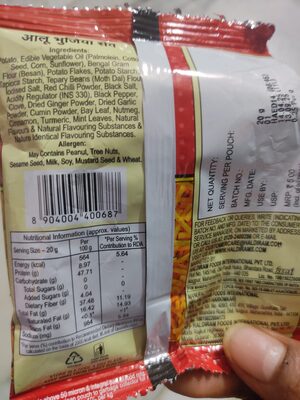
Barcode: 8904004400687
Haldiram’s Aloo Bhujia Sev
HALAL
📝 Reason: Most ingredients in this product are plant-sourced and Halal. However, the phrase ‘natural flavours & natural flavouring substances & nature identical flavouring substances’ is ambiguous and can be derived from animal or synthetic sources or processed with non-Halal solvents. In the absence of Halal certification, these are classified as doubtful. Islamic dietary law (Quran 5:3) prohibits ambiguous ingredients unless proven pure.
🏷️ Category: Snacks, Salty Snacks
📄 Certificates: Vegetarisch, Vegan
Ingredients:
Details
Understanding the Halal Status of Haldiram’s Aloo Bhujia Sev
When it comes to selecting snacks, ensuring they meet dietary guidelines is essential for many consumers. Haldiram’s Aloo Bhujia Sev is a popular snack that raises the question: is it Halal? In this post, we will delve into its Halal status, explore its ingredients, and clarify any concerns surrounding its certification.
Halal Certification Overview
Haldiram’s Aloo Bhujia Sev is classified as Halal, primarily based on the majority of its ingredients being plant-based. However, some components require closer examination due to the ambiguity surrounding their origins.
Ingredients Analysis
The snack consists of:
- Potato – A universally accepted vegetable, Halal by nature. Learn more.
- Edible vegetable oil (palmolein, cotton seed, corn, sunflower) – All types of oils listed are plant-based and Halal. Details Here.
- Bengal gram flour (besan) – A legume flour made from chickpeas, Halal in all forms. Explore more.
- Potato flakes – Deriving from potatoes, these are inherently plant-based and Halal. Source.
- Potato starch – Pure starch from potatoes is Halal. Find out more.
- Tapioca starch – Derived from cassava root, this is also Halal. Details.
- Tepary beans (moth dal) flour – This legume flour is plant-based and Halal. Read here.
- Iodised salt – A mineral salt considered Halal. More Information.
- Red chilli powder – Another spice sourced from plants and Halal. See Source.
- Black salt – A mineral salt with natural flavor, deemed Halal. Details Here.
- Acidity regulator (INS 330) – Commonly known as citric acid, usually plant-derived and Halal. Learn more.
- Various Spices – Ingredients such as black pepper, cloves, dried ginger, and cumin are all plant-derived and Halal.
Concern Around Natural Flavours
The phrase natural flavours & natural flavouring substances & nature identical flavouring substances has raised some concerns regarding its Halal status. This component can derive from animal or synthetic sources and may involve non-Halal processing aids. In light of Islamic dietary law (Quran 5:3), such ambiguity is concerning. Therefore, without specific Halal certification for this ingredient, it remains categorized as doubtful.
Brand and Certification Context
Haldiram is a well-known brand in the snacks category, recognized for their delicious and diverse range of products. Their commitment to quality is evident, as they hold certifications such as Vegetarisch and Vegan for many items. However, clear Halal certification for each product or ingredient category is crucial for Muslim consumers. Although the majority of Haldiram’s Aloo Bhujia Sev ingredients align with Halal standards, the lack of certification for the natural flavours makes it imperative for consumers to make informed choices.
Conclusion
In conclusion, Haldiram’s Aloo Bhujia Sev is generally considered Halal based on its primary ingredients. However, the ambiguity surrounding natural flavours requires cautious consideration from those following strict Halal diets. Always look for certification and transparency from manufacturers to ensure the products meet your dietary requirements. Stay informed and make the best choice for your health and beliefs!
